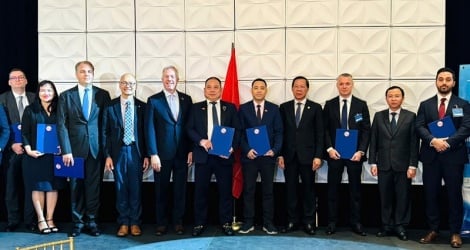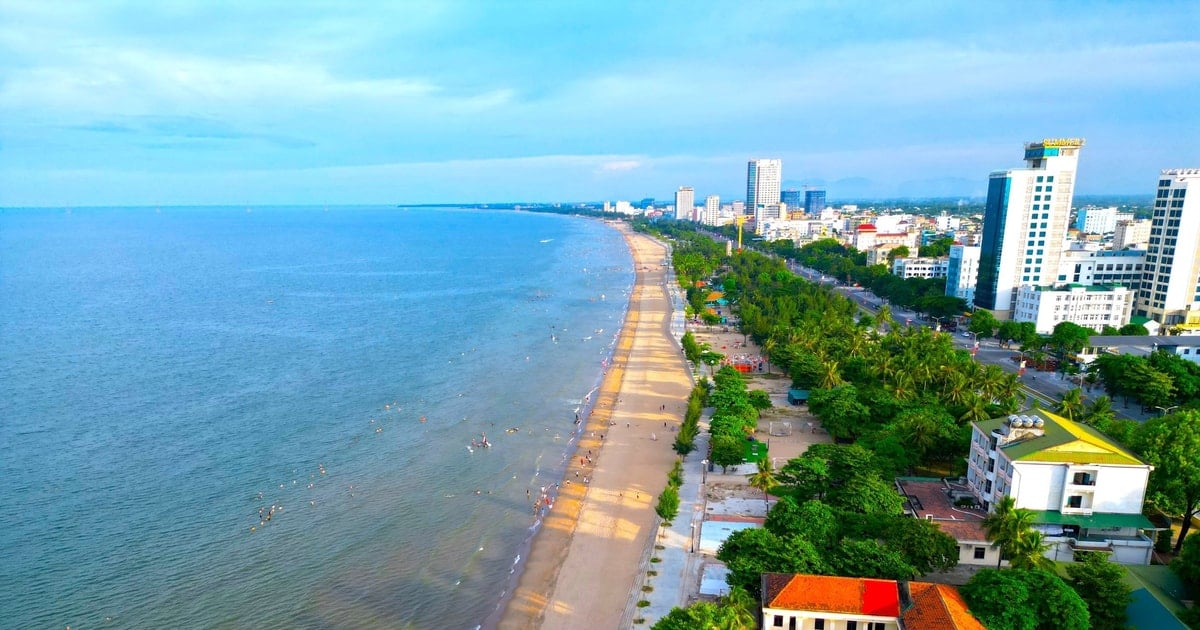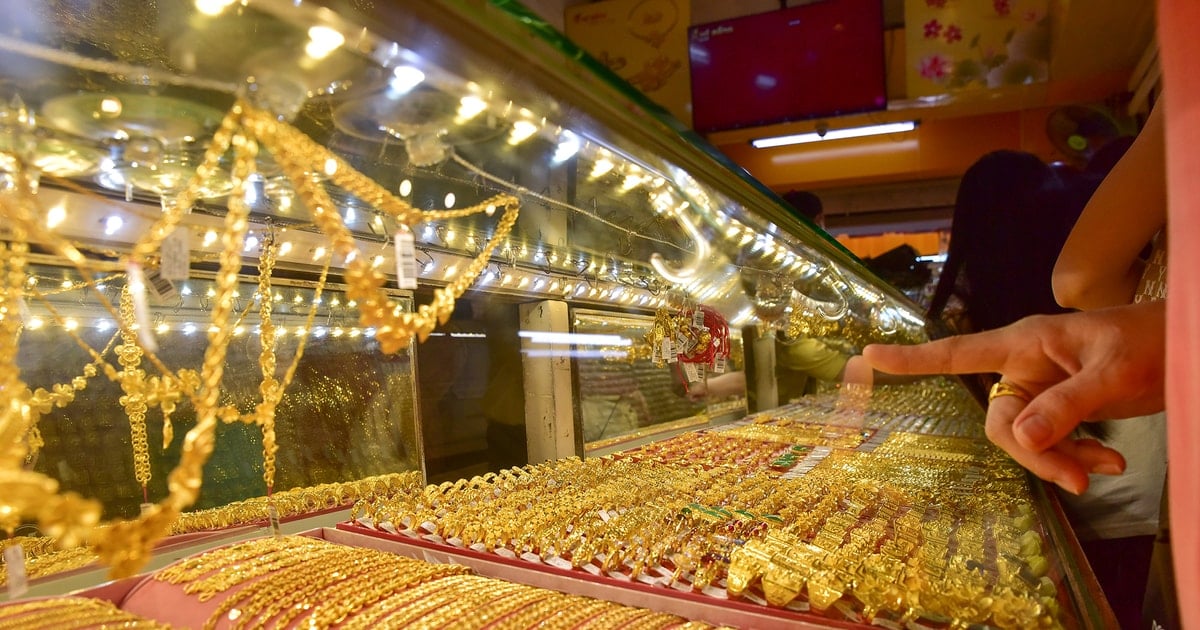Having worked as a porter with his mother to make a living, Thien became a postdoctoral researcher in civil engineering and was invited to interview for a first-level professor position by several schools in the US.
Tran Quoc Thien, 31, was accepted into a postdoctoral program at the University of Texas-Austin in December 2023. This is the 4th ranked school for civil engineering in the US, according to US News, surpassing Stanford University, Cornell, and MIT.
He was also invited to interview at Princeton University for a similar program, but declined because he couldn't pass up the opportunity to learn from Professor Maria Juenger, vice president of the American Concrete Institute, which develops and enforces concrete standards, with 30,000 members from more than 100 countries.
Before that, Thien successfully defended his PhD in Civil Engineering, along with his Master's degree in Materials Science at Virginia Tech University, in nearly 3 years, although it normally takes about 5-6 years to complete. Here, Thien participated in many research projects on the application of industrial recycled materials, sponsored by the Air Force or the US Tire Research Center...
In addition, Thien was invited to interview for the assistant professor position by two universities (one of three professorial ranks in the US, including assistant, associate and full professor). He acknowledged that he might not be successful right away, but he was still excited to wait for the results.
"I'm not afraid of failure. Being on the shortlist of schools means I've surpassed 90% of 200-300 candidates in the industry, so I have to be confident," he said.

Tran Quoc Thien in a laboratory at Virginia Tech University. Photo: Character provided
Thien was born in the suburbs of Hoa Vang district, Da Nang city. His father died when he was not yet 2 years old, so Thien and his brother had to work hard with their mother to make a living.
"I used to have no dream other than my mother selling all the sticky rice. When I grew up, I thought I had to escape poverty, so I wanted to work hard and also learned by myself," he shared.
During his high school years, Thien also worked with his mother to carry and transport construction materials, day or night, as long as there was work. Seeing that the construction industry had many job opportunities, Thien applied for only one major, the Bridge and Road Construction Department, Da Nang University of Technology, and was accepted.
He admitted that he was a good student but not outstanding, and his English was not fluent. In his third year of university, while participating in volunteer activities, Thien met and was taught English for free by an Australian man.
"But at first, I didn't understand what I was learning so I gave up. After I started working and realized the importance of English, I took the initiative to learn with my uncle's help so it was very quick. After a year, I was able to use English," Thien recalls.
In 2016, after working as a construction engineer for a while, Thien wanted to study more and "escape the repetitive life". He happened to know that a professor at Chonnam National University, South Korea, was recruiting master's students in Hanoi and Ho Chi Minh City. Unable to quit his job but still wanting to seize the opportunity, Thien "took a risk" and emailed the professor, asking for an interview via Skype. He honestly said that he was not good at his profession and had financial difficulties, but was very interested in researching construction materials.
"Later, the professor said he considered me and another very good friend. In the end, he chose me, probably because of my honesty and enthusiasm at that time," Thien shared.
Thanks to that, in March 2017, Thien arrived in Korea with a full scholarship, having the opportunity to access technology and a modern learning and working environment. Thien participated in research on many topics such as Safety assessment for power transmission tunnel systems (sponsored by the Korea Electric Power Corporation), Reuse of industrial waste used in soil reinforcement techniques in Korea (sponsored by the National Research Foundation of Korea)...
Thien recognized that the Korean professor was difficult and demanding, causing him to face a lot of pressure. However, thanks to that, the young man from Da Nang had a strong profile after graduating, opening up many scholarship opportunities at leading schools in construction engineering in Australia and the US, including Virginia Polytechnic University - ranked 6th in the US for the Construction major.
During his PhD, Thien was most proud of developing a new experimental model for measuring the CO2 absorption capacity of cement concrete. He said that the production of one ton of cement releases approximately one ton of CO2 into the atmosphere. Therefore, many leading research groups in the world are working to find ways to increase the CO2 absorption capacity of materials using hydraulic binders.
To do this, they needed a machine that cost tens to hundreds of thousands of dollars to measure. He and his professor, in collaboration with the US National Institute of Standards and Technology (NIST), developed a simpler chemical experimental model called the "digestion-titration method", which saves 80% of the measurement time, produces equivalent results, and is much cheaper.
"This is important, especially in places where facilities and laboratories are still limited," Thien said.
He and his team are working to develop a U.S. material standard for this experimental model. He is also working to create a cement that emits 40 percent less CO2 than conventional cement.

Thien instructs master's and doctoral students at the University of Texas-Austin. Photo: Provided by the character
Dr. Hoang Phuong Tung, a lecturer at Da Nang University of Technology, knew Thien when he was doing scientific research in the Department of Automobile Roads. Mr. Tung was the first person to suggest Thien to study abroad because he saw that his student had the ability to continue his studies.
"Thien is not the best student but he is progressive, agile, likes to explore and take on challenges. In particular, Thien is very diligent," Mr. Tung shared.
Looking back on his journey, Thien believes that in addition to his difficult childhood, the perseverance learned from his mother and the curiosity about the construction field that he was attached to from a very early age helped him advance on the path of education.
"When you have to learn something by force, no matter how excellent you are, you cannot go far. On the contrary, if you find it curious and interesting, you will learn it very quickly and persistently. And of course the results will be better," Thien said. His goal is to become a professor, teaching and researching construction materials science in the US.
Phuong Anh - Vnexpress.net
Source link




![[Photo] "Beauties" participate in the parade rehearsal at Bien Hoa airport](https://vstatic.vietnam.vn/vietnam/resource/IMAGE/2025/4/11/155502af3384431e918de0e2e585d13a)

![[Photo] Looking back at the impressive moments of the Vietnamese rescue team in Myanmar](https://vstatic.vietnam.vn/vietnam/resource/IMAGE/2025/4/11/5623ca902a934e19b604c718265249d0)
























![[Photo] Summary of parade practice in preparation for the April 30th celebration](https://vstatic.vietnam.vn/vietnam/resource/IMAGE/2025/4/11/78cfee0f2cc045b387ff1a4362b5950f)






















































Comment (0)